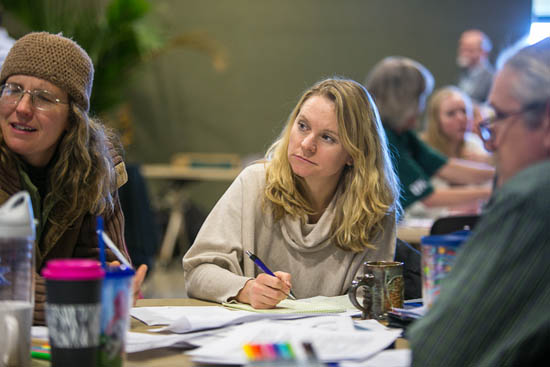Farms Feed Kentucky: Tackling the food issue from the inside
Farms Feed Kentucky: Tackling the food issue from the inside

In a county where 83 percent of the land is used for agriculture, but nearly 30 percent of the adult population is considered obese and 13 percent has diabetes, the question might be asked, why aren’t people eating better?
This example is taken from Barren County, but Barren is certainly not alone, nor is it fair to single it out as the sole example. In county after county in Kentucky, studies show that more access to better food is sorely needed. Farms Feed Kentucky is a new project sponsored by University of Kentucky Cooperative Extension. Teams from Barren, Clark, Fayette, Franklin, Madison, Pendleton and Whitley counties are part of the pilot project, individuals working together to find viable, locally based solutions to building a strong community food system from the inside out.
Each team is made up of at least one extension agent from that county and local advocates who might represent groups such as the health department, the city or county government, hospitals and schools. Farmers and advocates passionate about local food also are involved.
Janet Mullins, associate extension professor in the UK Department of Dietetics and Human Nutrition, said UK Cooperative Extension has put a lot of effort into encouraging people to eat better and providing them with the education and tools to do it. From farm-to-school programs, support for farmers markets, farm production and marketing advice, the outreach arm of the UK College of Agriculture, Food and Environment has been at the forefront of this issue for years.
“What people really don’t have is a local leadership group that is ready to build community around food. Because food is so important,” Mullins said. “There are many aspects to think about, and we (Kentucky Cooperative Extension) are going to help them do that.”
Mullins explained that a vibrant food system includes a flow of resources in and out of the community. Farmers, food entrepreneurs and consumers play a key role.
For instance, there is limited access to fresh, whole foods in Pendleton County: one farmers market, one local grocery, one Dollar General store and generally a long round-trip drive to other grocers. At this time, there is no farm-to-school program in the county. And yet area producers grow fruit, meats, poultry, vegetables, value-added products and honey, so the potential is there. The Pendleton six-member team includes two extension agents, a judge who is also a farmer, a member of the extension council, a member of the farmers market and the director of Pendleton County Schools Food Services. The team agrees there is a lot of community interest in improving the system, but they need better infrastructure, including a local full-service grocer, a commercial kitchen and perhaps a meat processor. Their job is to figure out how to attract and then support them.
Early on, the teams are expected to establish priorities in their counties.
“One of the things I find in doing this work in local foods is there’s so much information, and it’s coming so quickly, that there is almost too much,” Mullins said. “So we’re going to try to help teams look at what their county’s assets are, where the gaps are and what they might be able to do as a community to change things. We’ll give them the time and space to come together and think about what’s important in their communities, and then we’ll help them identify resources to make their dreams come true.”
Some might wonder how much difference a local food system can make to a community.
Lee Meyer, UK agricultural economist and extension professor for sustainability, said, “A strong local food system will add diversity to the local market opportunities for farmers and increase their viability.”
He pointed out that a diverse economic base makes communities more resilient; instead of putting all their effort into building a manufacturing economy, for example, a community that focuses on more than one economic driver will ride out bad times more easily.
Consumers can also benefit economically because of the greater supply and diversity of foods. This can entice new businesses to set up shop. As a local food system matures, product is delivered not only through farmers markets and community supported agriculture, but also increasingly through traditional channels like grocery stores and restaurants. In many ways, a strong local food system doesn’t just make healthy people; it makes healthy economies, too.
At the initial training session for the teams at Kentucky State University, Mullins quoted Dr. Gil Friedell, a Kentucky physician who was responsible for attracting young people to Eastern Kentucky to work in the health care field.
“If the problem lies within the community, so does much of the solution.”
Community & Leadership Development Agricultural Economics Extension

